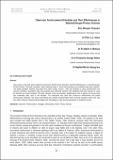| dc.contributor.author | Mary Wangari Kinyanjui, Peter JO Aloka, Sabina K Mutisya, Florentina Ndunge Ndeke, Naphtal Michira Nyang’ara | |
| dc.date.accessioned | 2020-08-05T06:33:19Z | |
| dc.date.available | 2020-08-05T06:33:19Z | |
| dc.date.issued | 2015-09-04 | |
| dc.identifier.uri | https://repository.maseno.ac.ke/handle/123456789/1803 | |
| dc.description.abstract | The purpose of the study was to determine Classroom Reinforcement Schedules and Their Effectiveness in Selected Kenyan
Primary Schools. The study employed a Mixed Methods design in which both quantitative and qualitative data were collected.
The target population teachers and pupils from public primary schools. Data was collected by using questionnaires and
interview schedules. Quantitative data was analyzed using inferential statistics while Qualitative data was analyzed by using
the thematic and content analysis. The study reported on the use of praise, tangible items such as games and money were
also moderately often used by the teachers. The participants also used both Continuous reinforcement and partial
reinforcement schedules. The study recommends that, schools should enhance token economy programs which have long
term effect. Moreover, teachers should deepen their knowledge on token economy programs for academic success. | en_US |
| dc.publisher | Journal of Educational and Social Research | en_US |
| dc.subject | Classroom, Reinforcement, Strategies, effectiveness, Public, Primary Schools | en_US |
| dc.title | Classroom Reinforcement Schedules and Their Effectiveness in Selected Kenyan Primary Schools | en_US |
| dc.type | Article | en_US |

